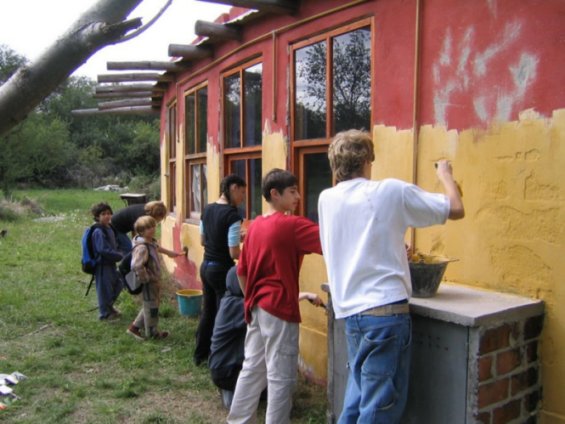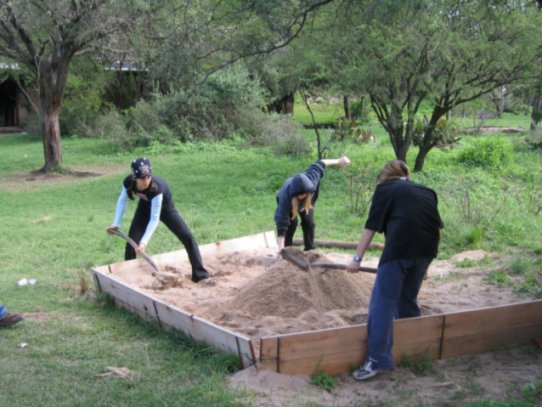Editor�s Page
Gringos Visit a School in Argentina
Everyone who stays abreast of the news knows that the United States is generally hated in the Arab world. It will be no surprise, then, if I say that the U.S., though not exactly hated in the rest of the world, is at least resented, more likely despised, and that includes Argentina and the rest of Latin America. This hatred and resentment inevitably rubs off, albeit often unconsciously, on Americans. Not all Americans bomb innocent civilians, torture and humiliate prisoners and lie to the world. Most are even opposed to such things. Nevertheless, it rubs off.���
It wasn�t always so. Already an expatriate when John F. Kennedy was assassinated, I remember the outpouring of grief, not only in the U.S., but in the world at large.� I remember the lines stretching for blocks around the consulate in Buenos Aires: people waiting to sign the condolence book. Due only to the fact that I was a U.S. citizen, I received letters of condolence from people I barely knew. It rubbed off.�
I am well aware of the apparent contradiction that the United States is still a potent attraction for many in less endowed, third world countries who are trying to enhance their living standard. Call it then a love-hate relationship, with the love part desintegrating fast.
Many of you will have noticed an appeal for donations for the Argentine Waldorf school �El Trigal�. Some readers have even responded, for which the children, teachers and parents are most grateful. However, I would like to describe now a response which went far beyond anything expected.
In April of this year, shortly after Easter, a group of gringos from the Marin Waldorf School in California came to do community work � eighth -graders, two mothers and their teacher. They didn�t come as ambassadors of good will, they had no political agenda, they weren�t thinking of Afghanistan or Iraq; they only wanted to help. So they came. Correction: not all gringos � the teacher, Claudio Salussos, is an Argentine who has lived in the U.S. for twelve years. He provided the Argentine connection.
They came with bags full of school materials: beeswax crayons, watercolors (all very expensive here), sweatshirts with the Marin logo for the kids, etc., and the will to work.

They painted the whole school.

They built a playground slide (with considerable help from �Jota�, a school father who is a carpenter).

And rebuilt the sandbox.
El Trigal�s children were fascinated to realize that there are people in the world who actually speak English. One of our little wise guys, wanting to test his English, walked up to one of the gringos who was painting and asked: �What is your name?�� �Bennett. What�s yours?� �Shut up!� And he ran off before Bennett could catch him.�
����
There was of course social interaction between the two groups. The day after they arrived was Claudio�s birthday, so one of the teachers baked a cake and the music teacher organized a songfest homage. Just an example.
The Marin school near San Francisco is a �Waldorf� school, as is El Trigal: another connection. At a time when everything is being privatized, including the war and, yes, even education, it is necessary to mention how mistaken this is. Although it has become obvious that the state is incompetent in the field of education, the neocon knee-jerk is to turn it over to private economic interests. Recognizing that the state has no business running schools is correct; turning to private enterprise as though the schools were railroads can only make the situation worse. Both El Trigal and Marin are owned and operated by not-for-profit civil corporations with parents as Board members. Even if there were profits, which there aren�t, there are no stockholders, partnerships or individuals to receive the benefits. All income is used to cover school expenses. Educators the world over would do well to study this concept and pressure the political state to make the obviously necessary corrections in the system.
The gringos came with $1,000 to spend on materials and/or donate to the school. The materials (paint, brushes, lumber, etc) came to approximately $300. The difference has been applied to the campaign to raise $7,000 in order to cover El Trigal�s 2004 deficit. So far about $2,000 has been donated. If you haven�t done so already, why not take a look at El Trigal and test your generosity IQ? Every little bit helps, because hard currency goes a long way here.
Who are they?
The kids: Angela, Bennet, Cole, Gabi, Galya, Mason, Nicholas, Nicky.
The mothers: Jody, Frances
The teacher: Claudio
Gracias, amigos!
The Marin school visit is a small thing when viewed from a universal perspective. But even so, it had a big impact on a small group of children, their teachers and parents in a remote corner of the so-called third world. Bearing in mind the theory that the movement of a butterfly�s wings in Argentina (say) has a profound effect in California (say), maybe it�s not so small after all.
FTS�
